Colonialism of the Mind – Part I
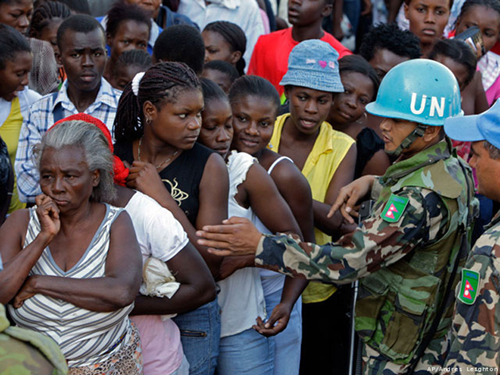
By Dady Chery
News Junkie Post
“Les intellectuels ont toujours été des courtisans. Ils ont toujours vécu dans le palais.” Pier Paolo Pasolini (1922-1975)
Western journalists increasingly assume the voices of subjugated countries’ natives while muzzling them by denying them access to the press. In the United States, the more visible venues of the alternative press, such as online news sites Truthout, Common Dreams, and Huffington Post are essentially closed to native writers. This colonialism of the mind is rampant when it comes to Haiti.
Inspect the U.S. alternative press for news of Haiti. You will find articles there by Beverly Bell, Mark Weisbrot, Robert Naiman, Jane Regan, Noam Chomsky, Stephen Lendman, and others, but you will be hard put to find a Haitian name. Westerners, whatever their political leaning, do reserve their right to rule the world, and the right to pontificate to the ignorant natives is very much a part of it.
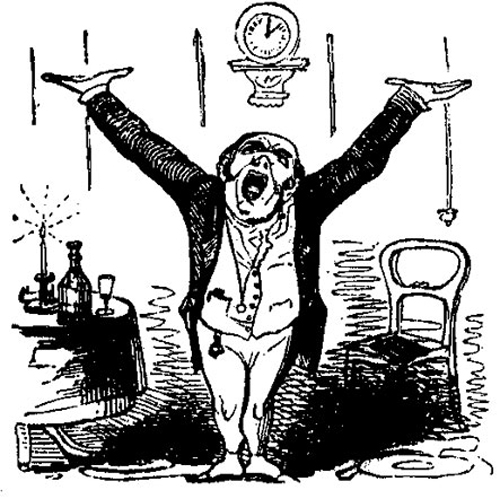
The current war against Haiti is an economic and propaganda war that requires a liberal use of aid money to undermine Haitian culture and agriculture. Such a war would be impossible without a simultaneous disinformation campaign to persuade the U.S., Canadian, and European public that their funds benefit Haiti. This is the task of the high priests of journalism. They promote the neoliberal agenda and encapsulate their disinformation in reasonable-seeming and progressive-sounding language.
On one issue after another, American speakers for Haiti cleverly echo “talking points” that are meant to enable neo-colonial policies. Their work is more insidious than that of the mainstream press, which is limited in its capacity to editorialize. In the hands of the colonialists of the mind, disinformation becomes a lethal candy: a cyanide pill coated with leftist-sounding sugar, much of it collected from the less visible publications of unacknowledged writers.
Blaming Isaac
Consider for example the recent Truthout article titled “Disaster Capitalism in New Orleans and Haiti”, in which Beverly Bell, who directs several NGOs and sits on Truthout’s board of trustees, promoted two current mainstream “talking points” about Haiti:
1. Expect a massive resurgence of cholera due to tropical storm Isaac.
2. Expect intense hunger due to Isaac.
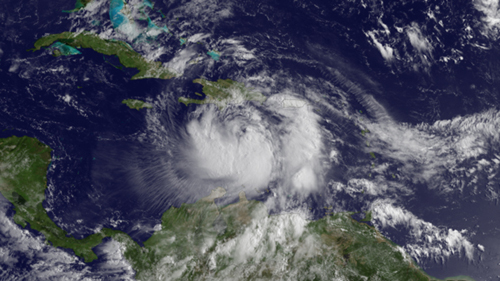
Satellite image of Isaac at 13:15 EST on Friday, August 24, 2012 (Credit : NOAA).
The two talking points — presented early in Bell’s article — are actually the reason for the article. The rest is decoration with history, culture, and politics liberally borrowed from the essay “New-Orleans & Port-au-Prince: Two Tales Of Government Failures”, published two years earlier by Gilbert Mercier in News Junkie Post.
I invite the reader to compare the two articles and learn to recognize the strategy of embedding items of disinformation within a text that appears to be truthful and
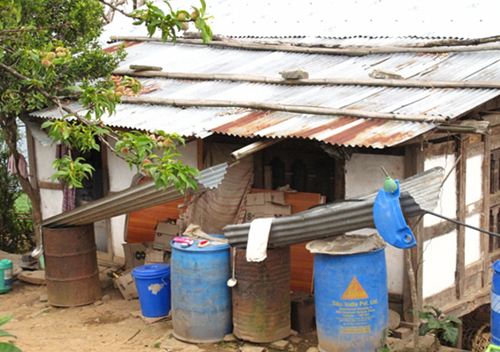
Makeshift rain water harvesting system (Credit: Bhutan Observer).
“A disease of the poor”: Haitians as the unhygienic ones
The above predictions from Isaac were not the first campaign to blame cholera on something other than its actual source. When cholera first appeared in Haiti in October 2010, the disease, which was certainly known by U.S. and U.N. authorities to originate from U.N. troops, was immediately attributed to the terrible hygiene of the Haitian poor and, by extension, predicted to grow into a massive epidemic, especially in the homeless camps.
On November 18, 2010 CNN wrote:
“A lack of treated drinking water, coupled with poor hand hygiene and food-preparation practices, make the 1.3 million people still living in camps particularly vulnerable, according to a new study published by the U.S. Centers for Disease Control and Prevention….
“The CDC has said the strain of the cholera bacteria responsible is “indistinguishable” from one found in other parts of the world, including south Asia, but researchers are unlikely to be able to pinpoint how it arrived in Haiti.”
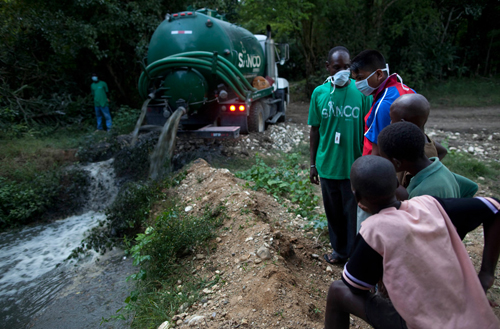
Tanker
truck dumps excrement from Nepalese U.N. base 400 meters away from the
base in Mirebalais, Haiti on Oct. 27, 2010 (Credit: AP/Ramon Espinosa).
“This past week has… provided the perfect conditions for a spike in cholera, what Partners in Health calls ‘a disease of poverty’ which impacts those without safe drinking water…. Because sanitation workers could not get to the camps, toilets and garbage overflowed to extremes…. The sporadic rains throughout the week, moreover, spread contaminated water and sewage, perfect vectors for the disease.”
This enthusiasm to blame the poor for their misfortune was decorated with passionate language that appeared to defend the poor and decry their living conditions. In fact, the cholera predictions were unfounded. Haiti’s cholera outbreak was most serious, not in the camps in Port-au-Prince – home of the poorest of the poor — but in a pristine rural region that had become contaminated by the wastes of Nepalese soldiers from a U.N. base.
There was never any basis to the prediction that cholera would become epidemic in Haiti, and there is still no basis to the predictions that it will spike or indefinitely continue. Last April Dr. Renaud Piarroux argued that Haiti’s cholera could be gone in a matter of months, and as Cuba recently showed, an outbreak of cholera can be stopped in as few as 60 days with the appropriate education, epidemiological surveillance, care, and provision of clean drinking water.
1 comment:
Thank for nice article..I like it
Also visit my web site:: snazzy
Post a Comment